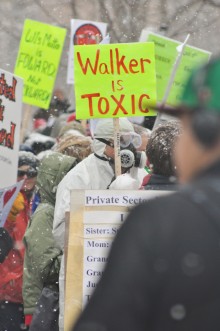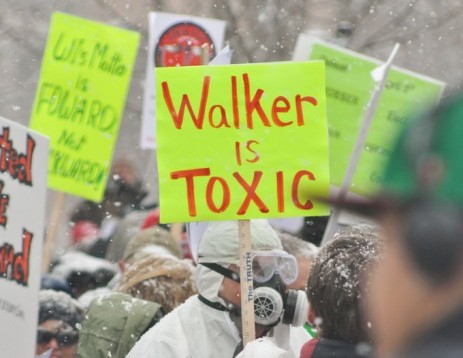 Photo: Andrew ButittaIn the past few weeks, we’ve seen the fiercest attacks in recent history on collective bargaining. We’ve also seen the dramatic responses of people taking to the Wisconsin statehouse and the streets to stand together for their rights. Why are some environmentalists among them, and why should all environmentalists join the fight?
Photo: Andrew ButittaIn the past few weeks, we’ve seen the fiercest attacks in recent history on collective bargaining. We’ve also seen the dramatic responses of people taking to the Wisconsin statehouse and the streets to stand together for their rights. Why are some environmentalists among them, and why should all environmentalists join the fight?
On a straightforward level, unionized public workers maintain our parks, ensure our water is clean, and protect our air quality. Unions lead to longer-term employees and, in many cases, additional job commitment and higher quality services. Collective bargaining also leads to healthier workplaces. And when people have more job security and fewer worries about job safety, they are able to focus more on their communities, their children, and efforts to protect the environment. That could help explain why 60 percent of Americans oppose weakening the bargaining rights of public employee unions, according to a new poll.
Unionized workers and environmentalists have found a common adversary in Wisconsin Gov. Scott Walker (R). He showed himself to be a friend of multinational corporations with the $140 million in tax breaks he gave them in January. In a direct attack on environmental values and jobs, he rejected more than $800 million in federal funds for a proposed high-speed rail line. His alliance with the Koch brothers — confirmed by last week’s prank phone call — cements his standing as an enemy of environmental progress.
But this fight is much bigger than Wisconsin, and it’s about much more than the strength of public unions. A joke that’s been circulating on the internet gets at the heart of the issue: A unionized public employee, a member of the Tea Party, and a corporate CEO sit at a table with a dozen cookies on a plate. The CEO takes 11 of the cookies, looks at the Tea Partier, and says, “Watch out for that union guy — he wants a piece of your cookie.”
This is not about public sector versus private sector or union versus non-union. It’s about preserving and growing our middle class rather than widening the gap between the haves and the have-nots. It’s about standing up to corporations like BP and Peabody Coal and their political cronies. It’s about challenging the continued tax breaks and giveaways to dirty energy companies and Wall Street banks while working people’s wages and benefits are slashed. And it’s about realigning our budget priorities so the aim is to build healthy, equitable, and sustainable communities with quality career jobs, not to coddle politically connected corporations.
“These attacks on workers, the attacks on the EPA’s ability to protect our land, water, air, and health — they are all coming from the same place: corporations and their political allies,” said Michael Brune, executive director of the Sierra Club.
Two years into the Obama era, we expected we’d be making bold change on behalf of regular people and the communities where we all live; instead, we in both the labor and environmental movements find ourselves on the defensive. But this reactive moment could lead to proactive efforts to make the progressive movement stronger. As rallies pop up around the country to show solidarity with workers in Wisconsin, people are banding together, voicing their outrage, and calling out the real bad actors who got us into this financial and environmental mess in the first place. As Robert Pollin and Jeffrey Thompson write in The Nation, “let’s remember that the recession was caused by Wall Street hyper-speculation, not the pay scales of elementary school teachers or public hospital nurses.”
Labor and environmental organizations share a complicated history and have not worked together as often as they could have. This fight in Wisconsin provides an opportunity to shift that dynamic, hopefully for the long term. Joining together to defy Walker is the first step. Both of these movements should be about good jobs and a healthy environment; these goals are mutually reinforcing, not mutually exclusive.
At its core, this fight is about power — making sure that power isn’t concentrated in the hands of the super-rich. Both the labor and environmental movements want to move power away from corporations and spread it to everyday Americans. Together, we can work to restore America’s middle class and stand up to corporate greed and abuse.



